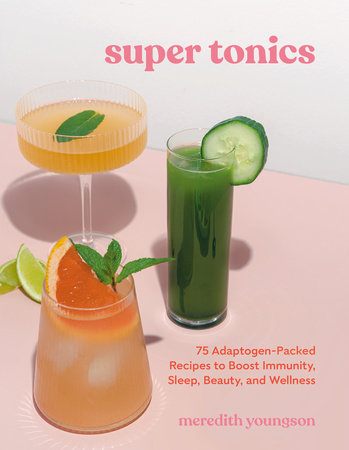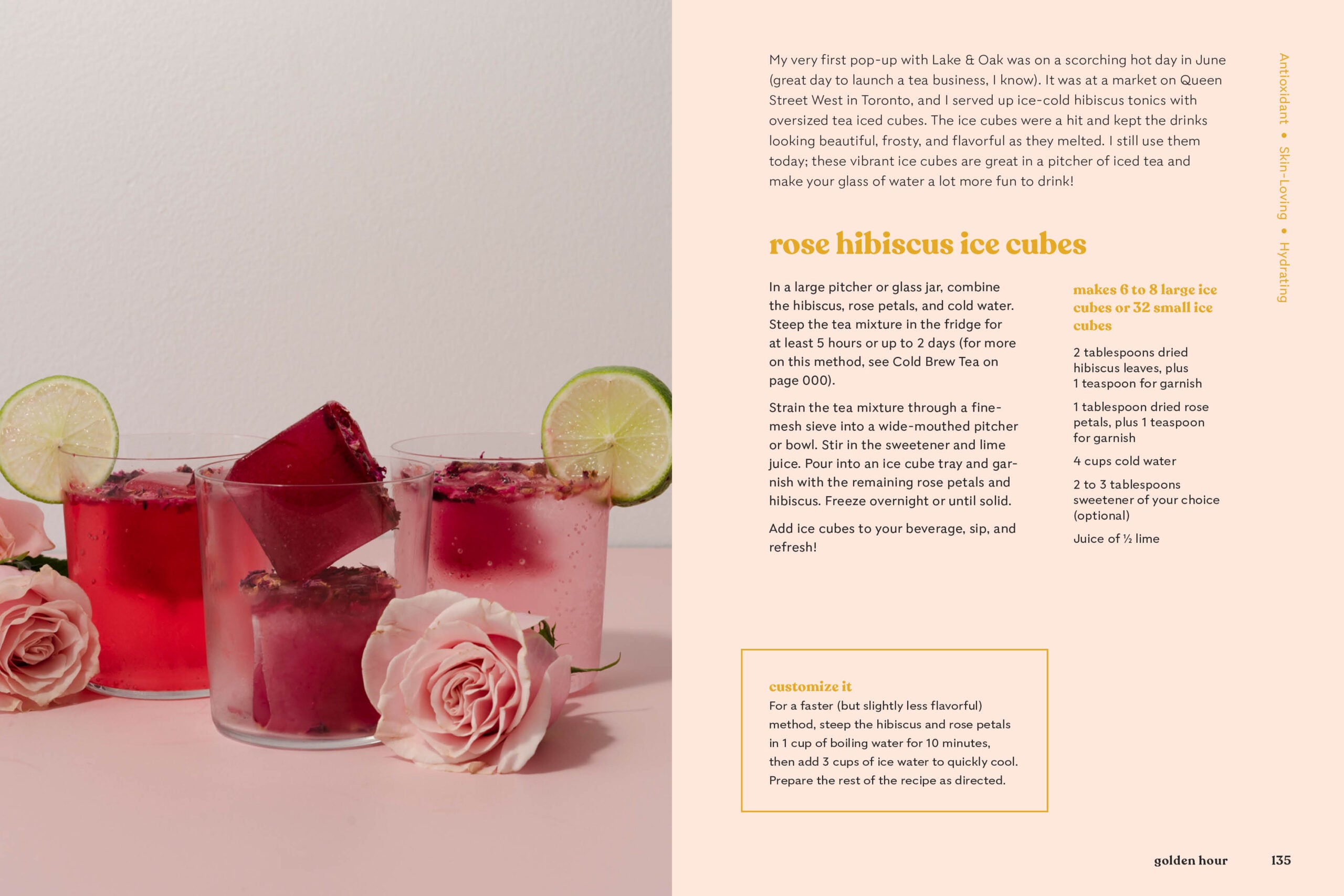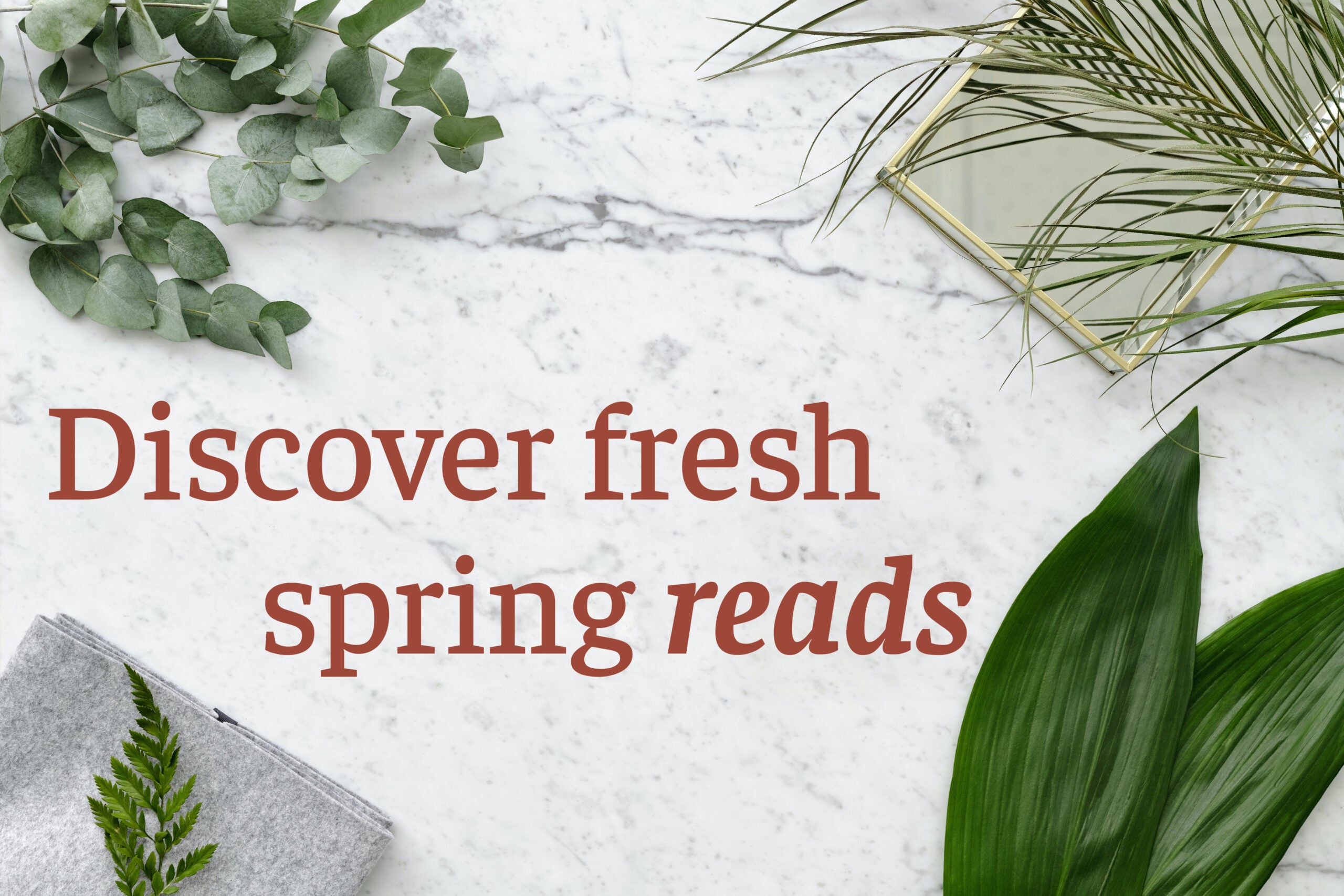IntroductionBefore we dig into all things tonics, let’s get on the same page about the terms
tonic and
elixir. In this book, I use them interchangeably to describe nourishing, feel-good beverages.
Some dictionary definitions of the word tonic are “a medicinal substance taken to give a feeling of vigor or well-being” and “anything invigorating physically, mentally, or morally.”
Elixir, on the other hand, is defined as “a particular type of medicinal solution.”
Spilling the Tea on Tonics Whether you are calling them tonics, elixirs, drinks, or magical potions, the recipes in this book are formulated with ingredients and techniques to taste delicious, make you feel amazing, and provide both instant and long-term benefits. You’ll notice from the pretty array of glassware that we are focusing on beneficial beverages in the form of teas, lattes, plant milks, smoothies, infusions, and hydrating elixirs. To complement the delicious wellness drinks, you’ll also find recipes for nourishing soups, grain bowls, salads, and power snacks to fuel your day.
The book is organized into sections by time of day, with tonics that will complement your daily rituals and patterns, whether it’s your hectic morning commute (Get Up & Glow, page 53), your 3:00 p.m. slump (Good Vibes All Day, page 95), your evening chill time (Golden Hour, page 127), or getting ready for bed (Beauty Sleep, page 159).
Tonics & Self-Care I believe there is a tonic to elevate every mood, lifestyle, or time of day. Whether you are juggling two jobs, starting a business, training for a marathon, or simply looking for more time to care for yourself, this book has a tonic to support you.
You’ll find everything from recipes that take thirty seconds to whip up as you are heading out the door (like the Love Your Guts Spritzer, page 133) to others that involve a bit more time and patience to create (such as the Tulsi-Lavender Lemonade, page 163).
Alongside all the tasty elixirs, you’ll find some of my tried-and-trusted tips for selfcare, mental health, and mindset sprinkled throughout the book. I like to think of tonics and self-care tools as puzzle pieces that fit together as part of our overall health and wellness.
In my own life and wellness routine, daily tonics are a consistent, grounding ritual that I use to help energize, de-stress, inspire, or ground myself. Whatever might be going on in my day, I look forward to taking care of my mind and body with a tonic.
My morning digestive tonic is more than a recipe; it also represents a time to slow down, check in with myself, and reflect. My daily Super Coffee (page 62) is loaded with things that prepare me mentally for whatever the day brings. The evening tonic I prepare—Chamomile Serenity CBD Latte (page 167)—helps me celebrate the little things (like getting through Monday!). As I sip slowly, my drink reminds me to connect to a more restful state and prepare for bedtime.
Life can move fast, and we tend to focus on the “doing” part of existence rather than the “being.” Taking these moments throughout the day for yourself is an act of self-love that can bring positive impacts to every aspect of your life.
Why You Should Care About Self-Care Self-care isn’t selfish. I remind myself of this when pangs of guilt set in for taking the afternoon off work for a mental health date, for clearing my weekend for some me time, or for stacking my bookshelf with personal development books.
Self-care belongs to everyone. Marketing and social media can have us believing that taking care of ourselves means splurging on a vacation or indulging in an expensive smoothie bowl. But my most satisfying days of self-care don’t involve time at the spa; rather, the satisfaction comes after setting boundaries in my relationships or doing little things that positively impact my mental health (like taking a walk in nature or having a phone-free evening).
My passion for self-care is rooted in the experiences I’ve had and the lessons I’ve learned on my mental health journey. As a young adult, the anxiety and depression I was struggling with for the first time left me feeling alienated, embarrassed, and unworthy. After reaching out to a therapist and speaking openly with friends and family, I began to explore ways I could feel empowered in my mental health and wellness. Developing a self-care routine has had a profound effect on my life, and yet, the journey isn’t over; in fact, it’s ever-evolving. Over the past decade I’ve built a toolbox of self-care practices that I refer to daily. To learn more about these tools, see Five-Minute Self-Care Practices (page 16). I also begin each chapter by offering ways you can incorporate self-care into your day. For now, here are more reasons to prioritize self-care.
Self-Care Is Good for Your Health In addition to the more obvious mental health benefits, our level of self-care can have an impact on our physical well-being. With stress being connected to so many illnesses, partaking in activities that benefit your mental and physical wellness can support everything from your immunity and energy levels to your digestion, sleep, and skin.
Self-Care Is Good for Relationships I know firsthand the impact that unchecked anxiety and overwhelm can have on a relationship. I used to pick fights and set unreachable expectations with my husband because of the turbulence I was experiencing internally. When I began to face my feelings and develop self-awareness, I became a better partner, daughter, sister, and friend. On the flip side, it is incredibly gratifying to see your actions of wellness and selfcare inspire your friends and family. I love to see my husband, Peter, enjoy learning a new skill, listen to an inspiring audiobook on the way to work, or connect with a friend. All of these are ways he de-stresses and takes care of himself.
Self-Care Makes You More Generous When we are anxious, unbalanced, and afraid, it can lead to a “lack mentality,” “scarcity mindset,” or the fear of limited love, resources, and opportunities. Those feelings of fear and needing safety and security can cause us to put ourselves first and others last. That might mean you can’t listen to a family member’s issue, you forget a friend’s birthday, or you feel jealous at a colleague’s success. When your own cup is full, you can freely give others more time, love, and energy.
Self-Care Has a Ripple Effect Each small action and interaction has an impact on someone else, for better or worse: the barista who makes your latte in the morning, your colleagues, your children, your parents, your friends. When you are feeling at peace and grateful, you can pass that energy along. Strive to leave the people you encounter in your day better than you found them. A smile, a compliment, or a bit of patience and compassion can go a long way. Sprinkle that sh*t like confetti!
Copyright © 2023 by Meredith Youngson. All rights reserved. No part of this excerpt may be reproduced or reprinted without permission in writing from the publisher.


























